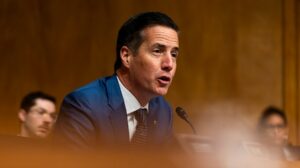Congress
House Democrats commiserate after Harris’ election loss as the blame game begins
House Democrats’ path to the majority is rapidly narrowing. The blame game over what went wrong is only just starting.
In a subdued, somber call, their first since Tuesday’s election, Democratic leaders projected confidence in their party and told lawmakers to wait to see the results of the races that still haven’t been called — as many rank-and-file members are starting to air grievances.
Democrats felt their leadership set expectations for how the call would go when Minority Leader Hakeem Jeffries told lawmakers to sit tight, according to two people on the call, and Rep. Jim Clyburn (D-S.C.), who was formerly whip of the House Democrats, told Democrats to stand with their leaders but to speak for themselves and their races rather than for the caucus as a whole.
Jeffries in a statement issued just before the caucus call said he congratulated Trump but believed House control was still up in the air.
“It has yet to be decided who will control the House of Representatives in the 119th Congress. We must count every vote and wait until the results in Oregon, Arizona and California are clear,” he said.
One Democratic lawmaker who requested anonymity to speak freely told Blue Light News they believe the call was calm as some incumbent Democrats are finding out they’ve lost their races and added they believed next week’s in-person caucus meeting will be where the real fireworks will happen.
“We need to be much more assertive when we’re telling leadership [what we think went wrong],” the lawmaker said.
But outside of the caucus call, Democrats from all sides of the party have begun sharing their thoughts on why they performed so poorly on Tuesday despite expectations that Vice President Kamala Harris could win and Democrats could flip the House.
One centrist Democrat, Rep. Tom Suozzi of New York, blamed the party’s perceived lean into political correctness for why they lost the election.
“Democrats need to focus more on issues Americans care about, like wages and benefits, and less on being politically correct,” he said in a press release also posted on X. “We failed as a party to respond to the Republican weaponization of anarchy on college campuses, defund the police, biological boys playing in girls’ sports, and a general attack on traditional values.”
Lawmakers are scheduled to return to Washington next week, though House Democrats aren’t expected to hold their leadership elections until the week after. House Democratic leaders had largely been expected to slot up a rung if they took back the House, though being relegated to the minority again could shake up their plans.
Republicans currently have the lead in the vote count, but control of the House still remains in question. Democrats had staked their path to the majority on flipping Republican-held seats largely in New York and California, and so far three of the New York seats have flipped to Democrats. Races in California will take longer to count.
But Democrats’ remaining paths to the majority are closing off after a handful of losses, including incumbents Susan Wild and Matt Cartwright and an open seat in Michigan.
Congress
‘I feel vindicated’: Anti-tariff Republicans cheer as Supreme Court checks Trump
Republican tariff skeptics on Capitol Hill celebrated Friday after the Supreme Court struck down the core authority behind President Donald Trump’s sweeping global tariffs — dealing a blow to a major plank of the president’s agenda but offering a welcome off-ramp to GOP lawmakers who viewed the levies as a political loser.
Retiring Rep. Don Bacon (R-Neb.) broke with Trump and GOP leaders a week ago to help overturn Trump’s Canada tariffs. On Friday, he hailed the “common sense ruling” by the high court that essentially invalidates those and many other tariffs.
“The checks and balances our Constitution puts in place works,” Bacon said in an interview Friday morning shortly after the decision, adding, “I feel vindicated.”
Another Republican who backed the effort to overturn the Canada tariffs, Rep. Thomas Massie of Kentucky, also praised the ruling.
“On its face, this case was obvious, because the Constitution vests the power to tax with the legislative branch, not the Executive branch,” Massie said in a text message. “No contrived emergency can undo that.”
Speaker Mike Johnson and other key GOP leaders did not immediately weigh in on the ruling Friday.
Trump himself appeared upset at the decision, cutting short remarks he was delivering to governors upon hearing the news at a White House breakfast Friday, according to two people in the room granted anonymity to describe the private event.
“He was not happy. He got the info in real time,” one of the people said.
Ahead of the Canada vote last week, Johnson said the congressional effort to overturn Trump’s tariffs was a “fruitless” exercise, given the Supreme Court could rule any day on the underlying emergency authorities Trump invoked to levy them. He urged his conference to hold off on breaking ranks until the decision, but Democrats successfully forced the vote in which all but six Republicans voted to back Trump.
The ruling comes just four days before Trump is set to deliver his State of the Union address to a joint session of Congress and an audience that will include the Supreme Court justices who rebuffed the cornerstone of his economic and foreign policy agendas.
A few GOP backers of the tariffs quickly spoke out, with Sen. Bernie Moreno of Ohio decrying the ruling as “outrageous” and saying it “handcuffs our fight against unfair trade that has devastated American workers for decades.”
“These tariffs protected jobs, revived manufacturing, and forced cheaters like China to pay up. Now globalists win,” Moreno added in a social media post Friday.
The ruling prompted tough questions for both parties about what comes next. Bacon indicated the decision could put an end to a flood of additional tariff disapproval votes headed to the House floor in the coming weeks.
“We’ll see if it’s necessary,” he said.
But House Democrats want to keep hammering Republicans on the topic in the weeks ahead.
And, Senate Democrats, according to a person granted anonymity to discuss private strategy, are waiting to see how Trump responds to the decision before determining whether to force more votes disapproving of individual emergency declarations.
Democrats in the Senate had hoped to put up the House-passed Canada resolution for a vote in the coming weeks, but there are ongoing internal conversations over whether it qualifies for special fast-track procedures allowing for a quick simple-majority vote, according to a second person granted anonymity to describe the matter.
Other Democrats said further action was needed to forestall the Trump administration from sidestepping the ruling, possibly by invoking separate national security powers. Rep. Suzan DelBene of Washington, who chairs the House Democratic campaign arm and sits on the chamber’s main trade panel, noted that the White House “has promised to use other avenues to maintain these illegal tariffs.”
“Congress must step up to put an end to this chaos and protect our economy,” she added.
Asked about the prospect of Trump trying to implement his tariffs through other avenues, Bacon said, “I think they’ll try, but it would not be advisable.” Friday’s ruling authored by Chief Justice John Roberts broadly defended Congress’s sole power under the Constitution to levy taxes.
Congress might also end up having to wrangle with the question of whether refunds are due to businesses or consumers who paid levies now found to be illegal.
“The Court has struck down these destructive tariffs, but there is no legal mechanism for consumers and many small businesses to recoup the money they have already paid,” Sen. Elizabeth Warren (D-Mass.) noted in a statement. “Instead, giant corporations with their armies of lawyers and lobbyists can sue for tariff refunds, then just pocket the money for themselves.”
Some Republicans are also urging congressional action in response to the ruling, with Rep. John Moolenaar of Michigan, who chairs the Select Committee on China, pressing for a revocation of Beijing’s permanent normal trade relations status.
Jordain Carney and Daniel Desrochers contributed to this report.
Congress
Republicans are ignoring Trump and holding out hope for a second megabill
President Donald Trump sent a clear message to congressional Republicans this month that there’s no need to pass another party-line megabill this year. Many, however, aren’t ready to give up yet.
Trump’s comments in a Fox Business Network interview earlier this month appeared to finally settle a long-running GOP debate over whether to pursue a follow-up to the “big, beautiful bill” enacted in July, saying “we’ve gotten everything passed that we need.”
But some lawmakers are insisting that the filibuster-skirting budget reconciliation process offers an unmissable opportunity for Republicans to enact major conservative policy changes ahead of the midterm elections — and that there is still a window to get it done.
Those Republicans are largely brushing off Trump’s comments, refusing to take them as a death knell for their efforts.
“One day he’s okay with it, and the next day he’s not,” said Sen. John Kennedy (R-La.), who is one of the loudest evangelists for passing another party-line bill before the midterms, arguing Republicans “haven’t done a damn thing” since last year’s effort.
Those attitudes threaten to extend the will-they-or-won’t-they discussion for potentially several more months as some factions keep pressure on GOP leaders to keep hope alive.
The influential Republican Study Committee, which includes scores of House conservatives, has been holding listening sessions since last August for what could go into “Reconciliation 2.0.” It put out a framework in January outlining how such a bill could fulfill an ambitious housing, health care and energy agenda. The group is not yet abandoning the effort.
“There’s always a chance until there’s not,” said Rep. Kevin Hern (R-Okla.), a former RSC chair and member of House GOP leadership.
Rep. August Pfluger (R-Texas), the RSC’s current chair, said in a statement that a second reconciliation bill would be “the perfect vehicle” to unite Republicans behind “Trump’s America First agenda in 2026.”
“This is our moment, and we intend to make the most of it,” he said.
But to many senior Republicans that amounts to false hope — and a distraction from other matters on the congressional agenda in the coming months. Hopes abound for progress on bipartisan housing, permitting and transportation bills.
It was a particularly grueling process to get the first megabill through both chambers last year — and leaders had $5 trillion worth of tax cuts to dangle in front of recalcitrant members to help push it along.
House Republicans barely passed the bill on party lines in July, and their margin has only decreased since: They can currently afford no more than one defection.
“I would love a second reconciliation bill, but I can count votes,” Ways and Means Chair Jason Smith (R-Mo.) said in an interview. “And we do not have the votes for a second reconciliation.”
Speaker Mike Johnson and other House GOP leaders insist they haven’t ruled out doing a second reconciliation bill and say it’s still an active discussion, even as some senior House Republicans and GOP leadership aides privately doubt they will ever have the votes to move forward.
Senate Majority Leader John Thune also hasn’t dismissed another bill — but privately there’s a hefty dose of skepticism among senators and aides that there’s much of an appetite for another big party-line heave.
Asked about Trump’s latest comments, Thune acknowledged in an interview that there’s interest among some members. But he added that Republicans have to be “realistic” about the prospects of assembling a proposal that can garner 51 GOP votes and withstand a free-for-all of politically tricky changes from Democrats.
“We have to have a reason to do it,” Thune added.
To get another bill across the finish line during a midterm year, Republicans would likely need Trump to articulate what precisely he wants in a bill and then for the president to spend weeks, and potentially months, trying to help round up the votes.
But Trump has expressed skepticism about reconciliation, further raising the likelihood that the prospects of another bill are DOA. In addition to his recent comments, he kvetched about how little can actually get done in a reconciliation bill during a meeting with Senate Republicans last fall, instead urging Republicans to break the filibuster — a nonstarter for a significant swath of the conference.
Trump rekindled that push Thursday, telling senators in a Truth Social post to pass a GOP elections bill by insisting on a “talking filibuster” that would theoretically force Democrats to hold the floor indefinitely. The Senate is expected to vote on the bill, but many Republicans aren’t interested in skirting the chamber’s 60-vote supermajority requirement for most legislation.
The intraparty division is expected to come to a head next month at the House Republican retreat in south Florida, where a second reconciliation bill will be a topic of conversation. A previous closed-door meeting of GOP lawmakers in December grew heated, with vulnerable Rep. Mike Lawler (R-N.Y.) saying it would “never” happen.
Reconciliation got a brief mention during a Senate GOP retreat earlier this month, but most of the focus was on a slate of bipartisan bills that could come up this year, as well as the need to promote last year’s megabill, according to attendees who were granted anonymity to describe the closed-door event.
But some Republicans on the Senate Budget Committee — including Chair Lindsey Graham (R-S.C.) — are pushing for more. Graham has told his members that he plans to move forward with a budget resolution that would tee up a second reconciliation bill aimed at beefing up military and border spending, addressing health care costs and targeting fraud in social services.
But according to his committee members, Graham hasn’t given a strict timeline for when he’ll start moving, and there’s skepticism that it will amount to much without GOP leaders’ involvement.
“I don’t know how you move forward without the majority leader’s okay,” Kennedy said in an interview. “Senator Thune wants us to only work on bipartisan bills. I love Senator Thune like a taco, but he needs to back off the crank if he believes that. There aren’t going to be any bipartisan bills — we’re right in the middle of the midterm election. Our one shot to get something is reconciliation.”
One of the other challenges is litigating what exactly would go into a second reconciliation bill.
Senate conservatives have floated taking another crack at healthcare, but that would risk exposing deep GOP divisions just months before the midterms. Many of the party’s most unifying health care proposals were omitted from last year’s megabill because of the Senate’s strict rules governing reconciliation.
Some senior House Republicans have discussed attempting to codify Trump’s tariffs in another party-line bill. But that long-shot effort is now effectively dead after six Republicans voted this month to reject Trump’s levies on Canadian imports — with more such tariff votes to come.
Asked about the possibility of codifying tariffs in a party-line package, Smith reiterated in an interview, “There’s not going to be a second reconciliation bill.”
Meredith Lee Hill contributed to this report.
Congress
Virginia Gov. Abigail Spanberger tapped for State of the Union rebuttal
Virginia Gov. Abigail Spanberger will deliver the Democratic rebuttal to President Donald Trump’s State of the Union address next week, Democratic Minority Leaders Hakeem Jeffires and Chuck Schumer announced Thursday.
Sen. Schumer said Spanberger “has always put service over politics,” and Rep. Jeffries praised Spanberger for her decisive victory in November’s election.
“She stands in stark contrast to Donald Trump, who will lie, deflect and blame everyone but himself for his failed presidency on Tuesday evening,” Jeffries said.
In a statement, Spanberger said Americans expect and deserve “leaders who are working hard to deliver for them.”
“We are at a defining moment in our nation’s history,” she said. “Virginians and Americans across the country are contending with rising costs, chaos in their communities, and a real fear of what each day might bring.”
Spanberger flipped Virginia’s governor’s mansion blue last year, becoming the state’s first female governor. She previously represented the commonwealth’s 7th District in the House. Before her time in politics, Spanberger served in the CIA.
The two minority leaders also announced Thursday that Sen. Alex Padilla (D-Calif.) will deliver the Democratic response in Spanish on Tuesday.
Padilla, the son of Mexican immigrants and California’s first Latino senator, garnered nationwide attention last summer after he was forcibly detained by officers during a press conference with Homeland Security Secretary Kristi Noem.
“As Donald Trump, Kristi Noem and MAGA extremists have tried to silence the voices of our Latino brothers and sisters, Senator Alex Padilla has consistently fought back and proven Democrats will not bend the knee to this out-of-control administration,” Jeffries said.
Schumer added that Padilla’s message will be a “sharp contrast to President Trump’s chaos and self-dealing.”
Padilla said he plans to discuss lowering costs, safeguarding democracy and reining in “rogue federal agencies” in his speech.
“Americans don’t need another speech from Donald Trump pretending everything is fine when their bills are too high, paychecks are too low and masked and militarized federal agents are roaming our communities violating Constitutional rights on a daily basis,” Padilla said.
Trump will address the nation from the Capitol on Tuesday, though a swath of Democrats have announced they plan to boycott the address. Jeffries, however, told reporters Wednesday that he plans to attend Trump’s speech.
“We’re not going to Donald Trump’s house, he’s coming to our house,” Jeffries said. “It’s my view that you don’t let anyone ever run you off of your block.”
-

 The Dictatorship1 year ago
The Dictatorship1 year agoLuigi Mangione acknowledges public support in first official statement since arrest
-

 Politics1 year ago
Politics1 year agoFormer ‘Squad’ members launching ‘Bowman and Bush’ YouTube show
-

 The Dictatorship5 months ago
The Dictatorship5 months agoMike Johnson sums up the GOP’s arrogant position on military occupation with two words
-

 Politics1 year ago
Politics1 year agoBlue Light News’s Editorial Director Ryan Hutchins speaks at Blue Light News’s 2025 Governors Summit
-

 Politics1 year ago
Politics1 year agoFormer Kentucky AG Daniel Cameron launches Senate bid
-

 The Dictatorship1 year ago
The Dictatorship1 year agoPete Hegseth’s tenure at the Pentagon goes from bad to worse
-
Uncategorized1 year ago
Bob Good to step down as Freedom Caucus chair this week
-

 Politics10 months ago
Politics10 months agoDemocrat challenging Joni Ernst: I want to ‘tear down’ party, ‘build it back up’








